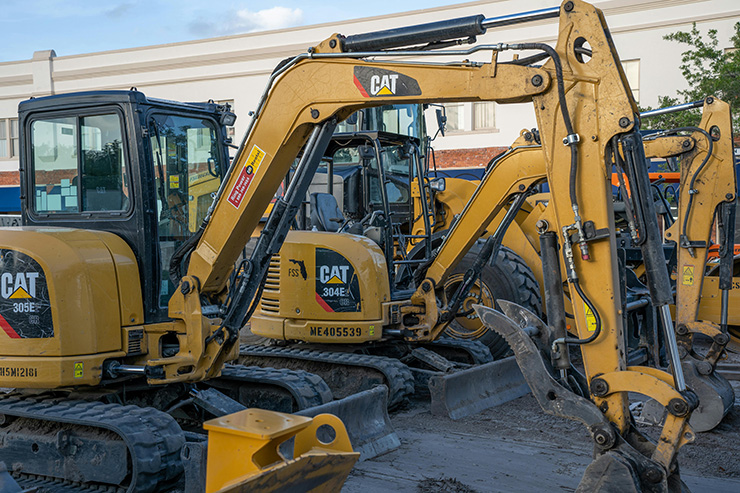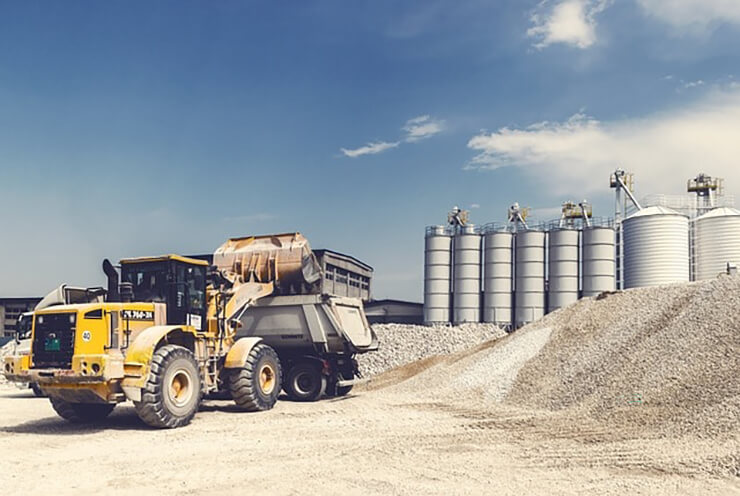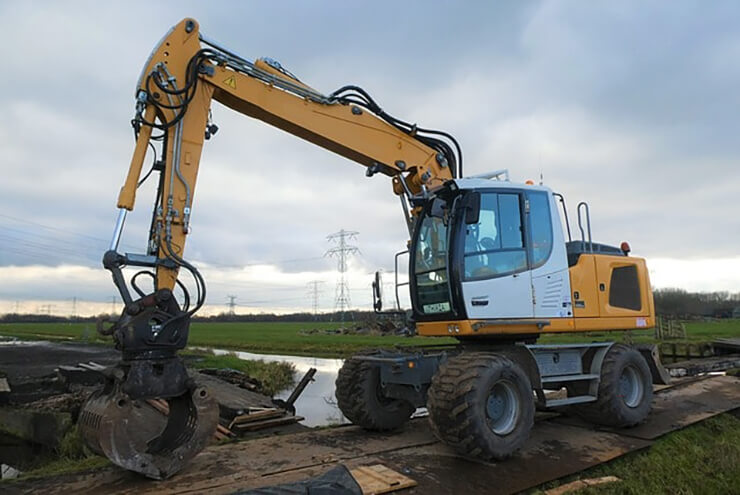Heavy Equipment Financing Options for Your Business
Need heavy machinery but worried about the cost? Heavy machinery financing can help. This article breaks down the top financing options available, so you can find out how to get the equipment you need without hefty upfront expenses. Learn how these options can support your business growth.
Machinery financing solutions for your business needs

Machinery financing is an essential tool for businesses looking to acquire machinery without large upfront costs. The primary aim of heavy equipment and machinery financing is to facilitate access to essential machines, making it feasible for companies, particularly in construction, to operate efficiently. This approach allows businesses to grow and succeed by acquiring innovative equipment, keeping their capital intact while managing necessary machinery costs.
One of the standout benefits of equipment finance is the ability to manage cash flow more effectively. Spreading the cost of high-value equipment over time allows businesses to avoid significant upfront payments and allocate resources to other critical areas. This method simplifies financial planning and provides predictability in project expenditure, particularly with fixed interest rates that protect against market fluctuations.
Repayment structures for equipment loans are another advantage. They typically include options like equal monthly repayments, giving businesses flexibility in how they manage their finances. Understanding the various financing options for construction equipment, heavy machinery, or other high-value assets can help you make informed decisions that align with your business needs.
Heavy machinery and heavy equipment finance – the basics
Construction equipment financing refers to the various financial solutions available for businesses to acquire high-value machinery needed for their operations. The benefits of such financing are many, including access to necessary machinery without the burden of immediate full payment, better cash flow management and potential tax advantages. This flexibility allows businesses to maintain operational efficiency and growth without depleting their capital reserves.

Industries such as construction, mining, farming, and manufacturing are the primary beneficiaries of heavy equipment and machinery financing. These sectors rely heavily on specialised machinery to carry out their operations efficiently. By leveraging equipment finance, these businesses can stay competitive and meet their operational goals without the financial strain of large capital expenditures.
Who benefits from machinery financing?
The construction sector is a major beneficiary of plant and equipment financing. This industry relies on essential machinery such as bulldozers, cranes, and excavators to complete projects efficiently. Financing allows construction companies to access modern equipment without significant upfront costs, thereby enhancing their operational capabilities.
Agricultural operations similarly benefit from financing for tractors and irrigation systems, which are crucial for improving productivity and profitability in farming. Manufacturers also rely on plant and machinery finance to acquire industrial machinery for optimising production processes and maintaining competitiveness.
Any business requiring high-value equipment can benefit from financing options. These solutions help businesses manage cash flow effectively, allowing them to allocate resources to other operational needs while gradually paying for necessary equipment.
Types of machinery finance
Heavy equipment and machinery financing offers various options tailored to different business needs. Each providing unique benefits and structures to suit diverse financial circumstances.
Asset leasing, chattel mortgages, and commercial hire purchases are among the financing options available, enabling businesses to choose what best fits their financial situation. Each option has its own terms and conditions, affecting how businesses manage their equipment acquisitions and cash flow.
The following subsections detail the specifics of each financing type.
Equipment Finance Lease
A finance lease allows businesses to use an asset while making regular payments, with the potential for ownership at the end of the lease term. This type of lease is particularly beneficial for companies that need to utilise equipment without making a large upfront investment. The business is responsible for all risks and rewards associated with the asset, including maintenance and repair costs. A significant advantage is that no deposit is required, simplifying the process of acquiring necessary equipment.
Asset leasing allows businesses to utilise equipment while making monthly payments, with an option to purchase at the end of the lease. This flexibility is essential for companies needing to manage cash flow carefully while accessing the necessary machinery to maintain or grow their operations.
Chattel Mortgage
A chattel mortgage is a loan where the equipment serves as collateral. In this arrangement, the borrower gains ownership of the equipment at the time of purchase, while the financier holds a mortgage as security. This means the business can use the equipment immediately but cannot dispose of it while it remains collateral for the loan.
The typical loan term for a chattel mortgage ranges from one to five years, providing flexibility in repayment schedules. This type of financing is similar to a standard car loan, where the lender can repossess the equipment if the borrower defaults on repayments.
Businesses often opt for this when they prefer to own machinery outright from the start, benefiting from potential long-term depreciation.
Operating Lease
Operating leases allow businesses to rent equipment without ownership, suitable for industries requiring flexibility. Accountants typically treat operating leases as operating costs rather than liabilities, which can be advantageous for financial reporting. Some operating leases permit upgrading equipment during the contract period, giving businesses access to the latest technology without additional costs.
Interest rates for equipment financing typically range from 2% to 20%, influenced by lender and borrower qualifications. This range reflects the varying risks and financial stability of borrowers and the type and age of the equipment being financed.
Hire Purchase
A hire purchase agreement is a loan type where the lender buys equipment for the business, which then pays regular fees to use it. This arrangement grants businesses immediate access to necessary equipment while spreading payments over time until ownership is attained.
It’s an attractive option for businesses aiming to maintain cash flow while acquiring the machinery needed to operate efficiently.
New vs. used equipment financing
When considering equipment finance, businesses often face the choice between new and used machinery. New equipment offers enhanced reliability since users are the first to operate it, leading to lower repair costs due to its lower likelihood of breaking down. Additionally, new equipment often comes with longer warranties, which can further reduce maintenance costs and provide peace of mind.
Used equipment generally has a lower purchase price, allowing for more budget flexibility. The lifespan and operational efficiency of used equipment can vary based on its maintenance history; however, older machinery may retain its resale value better due to slower depreciation. This can be a cost-effective option for businesses looking to expand their operations without incurring the high initial costs associated with buying new machinery.
Tax benefits of machinery finance

Utilizing heavy machinery financing can provide significant tax advantages. Interest on loans for equipment financing is fully deductible, which can lessen the overall tax burden on a business. Businesses can also claim depreciation on heavy machinery for tax purposes, further reducing their tax liabilities. This combination of deductible interest and depreciation can lead to substantial savings over the loan term.
For those financing equipment through a chattel mortgage, GST can be fully claimed upon the purchase of assets, providing immediate cash flow relief. Monthly lease payments in equipment leasing are treated as operating expenses and are thus tax-deductible.
These tax benefits make machinery or equipment loans a financially savvy option for businesses looking to manage cash flow efficiently while reducing their tax liabilities.
The role of a finance broker
Finance brokers play a pivotal role when it comes to financing heavy equipment. They provide expertise in finding the best loans, saving businesses time and money by offering tailored options and ensuring competitive rates. Brokers have connections with various lenders, which helps secure better rates including wholesale interest rates, and more favourable heavy equipment loan terms for their clients.
Brokers assist throughout the financing process, offering answers and guidance . This support is crucial, especially for businesses with poor credit history, as brokers can approach lenders willing to work with such clients, improving their chances of securing financing.
Using a finance broker can lead to streamlined applications, resulting in faster approvals.
How to qualify for a heavy equipment loan
Meeting specific criteria is essential to qualify for a heavy equipment loan. Businesses need an ABN, GST registration, a solid credit history, sufficient turnover, and manageable other debts. Factors influencing qualification include the total amount borrowed, the specific loan type, and the applicant’s personal circumstances.
Some loans may require a deposit to strengthen the application. Interim financial statements demonstrating current business performance are key documentation needed to bolster the loan application.
Essential documents for application
Preparing specific documents that demonstrate your business’s financial stability is crucial for securing a heavy equipment loan. Alongside financial records, additional documentation such as personal identification and tax returns is often required.
Ensuring all documents are accurate and complete can streamline the financing application process, making it smoother and faster.
Pre-approval process
The pre-approval process can significantly enhance your chances of securing a loan. The typical timeframe for pre-approval is immediate if eligible; otherwise, it can take around 24 hours.
Pre-approval helps businesses understand their potential financing options and budget for equipment purchases more effectively, making the final loan approval process quicker and easier.
Interest rates and loan terms
Interest rates for equipment loans may vary based on the lender’s assessment of the borrower’s financial stability and the equipment’s resale value. Loan terms can vary based on the equipment’s age, with newer equipment often qualifying for longer terms. Equipment finance rates also play a significant role in determining the overall cost of financing.
Understanding these factors can help businesses better prepare for the financial commitment involved in obtaining finance. Working with a finance broker can help businesses secure favorable terms that align with their financial capabilities and operational needs.
Tips for faster approval
A strong credit history is crucial for the approval process in equipment financing. Preparing comprehensive documentation, such as financial statements and business plans, can significantly speed up the approval process. Pre-approval can often be completed online, speeding up the process for eligible applicants.
Setting realistic expectations about financing costs and understanding credit quality can help set achievable goals and avoid disappointment. Being well-prepared and informed enables businesses to navigate the financing landscape more efficiently and secure necessary funds without unnecessary delays.
Managing cash flow
Managing cash flow is vital for businesses financing heavy equipment as outlined in Asset Finance 101. Structured repayment plans convert significant equipment costs into manageable monthly expenses.
Strategies like negotiating better payment terms with vendors, billing promptly, and forecasting cash flow help businesses anticipate shortfalls and manage funds effectively for business finance related to financing.
Effective cash flow management impacts overall operations, ensuring businesses remain financially healthy while meeting equipment needs.
Machinery or equipment finance offers numerous benefits, including access to essential machinery without significant upfront costs, better cash flow management, and potential tax advantages. By exploring various financing options with a trusted finance broker, businesses can find solutions that best fit their financial circumstances and operational needs.
FAQs
Financing offers the primary benefits of reducing upfront costs, enhancing cash flow management, and providing potential tax deductions on interest and depreciation. This approach allows businesses to obtain essential machinery while maintaining financial flexibility.
Various equipment financing options include finance leases, chattel mortgages, operating leases, and hire purchase agreements, each tailored to meet specific financial needs and circumstances.
A finance broker can significantly enhance the equipment financing process by offering expert guidance, access to customised loan options, and competitive rates, thereby increasing the likelihood of obtaining favorable terms.
You will need proof of business registration, financial records, asset details, bank statements, and cash flow forecasts. Additional supporting documents may enhance your application.
The tax benefits include deductions for loan interest and equipment depreciation, the ability to claim GST for chattel mortgages, and treating monthly lease payments as tax-deductible operating expenses. These advantages can significantly reduce the overall tax burden for businesses.

